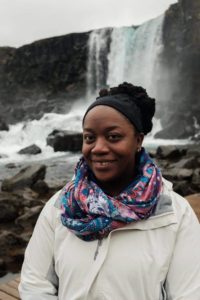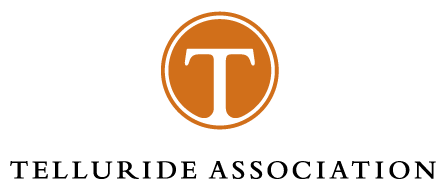
08 Nov Alumni Profile: Tiffany Yizar
![]()
 In our Alumni Profile series, we’ll be sitting down with Telluride alumni from a wide variety of fields who are making their mark on their profession and their communities. For our inaugural interview, we sat down with Tiffany Yizar, SS01 SP02. Tiffany holds a bachelor’s degree in chemical and biochemical engineering from Brown and an MBA with a specialization in supply chain management from the University of California – Los Angeles. Over the past decade, she’s worked as a packaging engineer for General Mills, PepsiCo, MillerCoors, and is currently a senior packaging engineer at Unilever. She lives with her husband, Troy Lochner, in Norwalk, Connecticut.
In our Alumni Profile series, we’ll be sitting down with Telluride alumni from a wide variety of fields who are making their mark on their profession and their communities. For our inaugural interview, we sat down with Tiffany Yizar, SS01 SP02. Tiffany holds a bachelor’s degree in chemical and biochemical engineering from Brown and an MBA with a specialization in supply chain management from the University of California – Los Angeles. Over the past decade, she’s worked as a packaging engineer for General Mills, PepsiCo, MillerCoors, and is currently a senior packaging engineer at Unilever. She lives with her husband, Troy Lochner, in Norwalk, Connecticut.
Q: Could you talk a bit about your path to engineering?
A: I will say, I stumbled into engineering. Growing up, I was always good at science and math – I remember wanting to be either an astronaut or a surgeon when I was younger. I have always loved to cook, and used to make my own recipes when I was growing up. In fact, my college essay was written about my love for Mrs. Dash, the no-sodium spice. However, through all of that, I did not know there was such a field as engineering, specifically chemical engineering. I must give credit to my mother, a now-retired guidance counselor, for suggesting that I “try out” chemical engineering when I was starting college. And then I did an internship at Avon Cosmetics in process engineering, and have been hooked on engineering as a career since then!
Q:What does a packaging engineer do? What does your work look like on a day-to-day basis?
A: Packaging engineering is a broader career choice. As a short-hand, I like to say that I play with jars and bottles. Essentially, in my role as a package developer, I design the structural package itself (regardless of graphics), and test it to ensure that a design on the page can be made in real life, replicated millions of times, filled with product, and protect the product quality from the plant, through transit, until the consumer decides to enjoy it.
During my career, I have also held jobs as a packaging engineer in a production environment, where I received the innovations created by package developers and was responsible for managing and maintaining the operations and equipment that makes millions of packages, fills them with product, and shipped finished goods out to stores. Those roles continue to inform my work today as a package developer, and gave me a unique insight into the realities (and hi-tech nature) of modern manufacturing in America. Let’s just say, I worked in plants that had all manners of robots….to make yogurt!
Q: Engineering often is seen as a very male and white or Asian profession. How has it been to navigate that space? Do you have any recommendations for other women and people of color interested in following your path?
A: Engineering, and any of the STEM fields, is undoubtedly majority male, predominantly white (and probably highly Asian in certain industries). The advice that I can give to women, and especially women of color, looking to enter the field is this: you are entering the field at a time where we are very self-aware about our need to improve representation – you can be a part of the solution. But you must also realize that in many ways you are still going to be a trailblazer. Trails are blazed with fire – you may get singed, but I promise, in the end you won’t get burned. You will have people who will doubt you, double check your work, or ignore your voice/advice/direction purely because you are female and/or a POC. You will experience micro- and macro-aggressions because of your gender and/or race. You may find that people hold low expectations of you, despite your resume, or try to “take you down a peg” when they feel you’re outshining them.
To excel and thrive in such an environment, the one thing I will recommend is that in addition to building your professional network, you must build a strong support of people who will push you to endure or honestly tell you when or if you need to leave a work environment that isn’t ready for people who look like you. Sometimes you just have to be like LeBron and take your talents elsewhere.
Q: What’s one way designing packaging has changed your perspective on a social/political issue?
A: Believe it or not, I’m very personally interested in sustainability – I’m a backyard gardener, try to reuse or upcycle whenever possible, etc. To some, that should put me at odds with my career. In fact, I am firmly proud about being “on the inside” capable of effecting positive change towards reduced packaging waste and non-renewable usage. The wheels of progress are inevitable; the expectation that society will move away from packaging all together is naive. I get to work inside an organization fully committed to exceeding the requirements of the Paris Agreement, and I personally work on projects focused on reductions of plastic usage, innovate new products focused on reduced water usage, and can leverage our scale to invest in green technologies. As an individual, I can make a personal impact. In my work as a package developer, I can make substantial global impact.
Q: In addition to a very active professional life, you play a major role in several volunteer organizations. What’s your proudest accomplishment in this realm?
A: In recent years, I have focused most of my volunteering and giving around encouraging and retaining POCs, especially women of color, in STEM-related fields, speaking at low-income schools and individually mentoring to help encourage people of color to pursue and thrive in an engineering career. In the near-term, I mark my progress in the academic and career progress of my mentees. However, I’m fully aware that this is a long-term labor of love, and I look forward to retiring in 35+ years seeing a significant uptick in the representation of people and women of color in the engineering and technology management.
I am also increasingly participating in my local government and community organizations to ensure that the democratic values I hold dear and the social progress we have made over the past century are not eroded but are further advanced. Many of those efforts include direct petitioning of my elected officials on behalf of various minority constituencies, as well as working with my local public library to foster conversations around race, gender, wealth and privilege.
Q: What role do you think Telluride programs (TASS and TASP) have played in shaping your current path?
A: In TASS’s nurturing environment, I elevated my thinking and writing to college-level, while still learning about a personally interesting topic of African American history. TASP continued that thought growth, but also helped me hone my skills of debate and self-confidence. Having participated in TASP as a former TASSer during the tumultuous times of the SCOTUS “Affirmative Action” case (Gratz v. Bollinger), I also learned how to defend my presence as a black woman in a traditionally white space, and identify and lean on allies to endure. Overall, I look back at both my TASS and TASP experiences, and all of my Telluride interactions with a great fondness and gratefulness of the friendships I’ve been able to forge with alumni and Association members along the way. And I remain strongly committed to the Association’s mission to foster intellectual curiosity and democratic participation, to grow leaders committed to public service.

Sorry, the comment form is closed at this time.